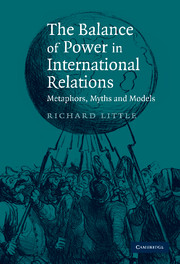1 - Reassessing the balance of power
Published online by Cambridge University Press: 05 October 2014
Summary
This book reassesses the important but also highly controversial role that the balance of power plays in the contemporary theory and practice of international relations. Attempts to understand international relations in terms of the balance of power can be traced back for more than five hundred years and no other theoretical concept can boast this length of provenance. But not only is the balance of power one of the most enduring concepts in the field, it also persists, by some considerable distance, as the most widely cited theory in contemporary literature. Jervis (1997: 131) concludes, moreover, that it is not only the best known, but also, arguably, the most effective theory available to account for the fundamental character of international relations. This is because, according to its advocates, the balance of power provides the ingredients needed to explain the resilience of the modern international system of states. It is no surprise, therefore, that ever since the end of the Second World War a succession of key theorists in iconic texts have attempted to demonstrate that the balance of power provides the foundations on which any overall understanding of international relations must start to build. This book focuses on four texts written during the era since the end of the Second World War that have all made significant albeit contentious theoretical contributions to the field.
- Type
- Chapter
- Information
- The Balance of Power in International RelationsMetaphors, Myths and Models, pp. 3 - 16Publisher: Cambridge University PressPrint publication year: 2007



